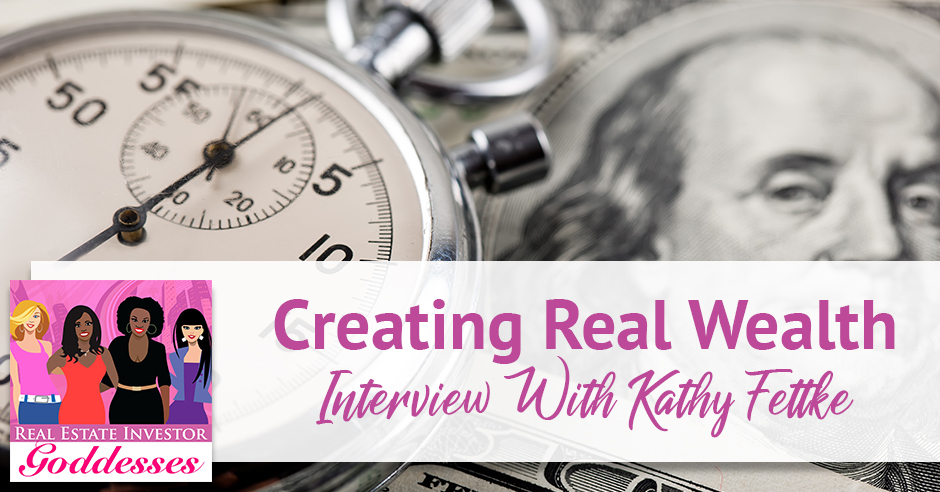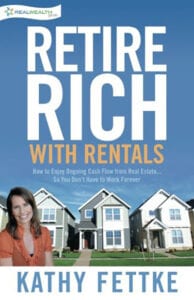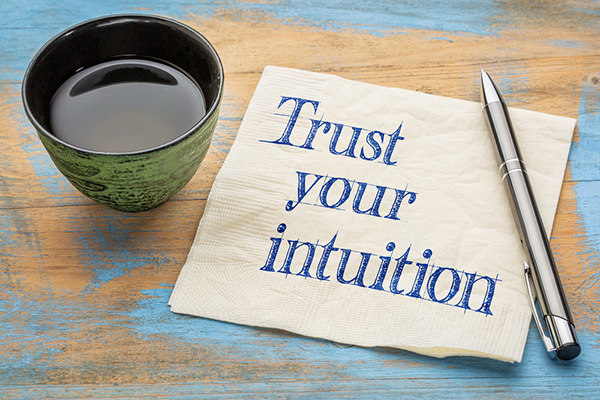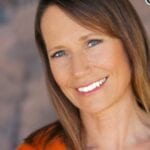
The way people define wealth falls on a vast spectrum of expectations. For real estate investor, licensed real estate agent and coach, Kathy Fettke, real wealth is about having the time and money to live life in her own terms. Kathy joins Monick Halm on the show where she shares her stellar journey on the road to real wealth. Kathy is the co-CEO of The Real Wealth Network, bestselling author of Retire Rich with Rentals, and host of two extremely popular podcasts – The Real Wealth Show and Real Estate News for Investors. Decades of experience in the business have given her a powerful message which she now shares to other women out there who are just starting out in real estate. If you are one, don’t miss this episode!
—
Listen to the podcast here:
Creating Real Wealth – Interview With Kathy Fettke
I am here with another incredible real estate investor goddess. On the show, we interview women who are killing it in real estate, and our guest most certainly is. Kathy Fettke is Co-CEO of Real Wealth Network and bestselling author of Retire Rich with Rentals. She’s an active real estate investor, a licensed real estate agent, and a former mortgage broker specializing in helping people build multimillion-dollar real estate portfolios that generate passive monthly cashflow for life. With a passion for researching real estate market cycles, Kathy is a frequent guest expert on CNN, CNBC, Fox, Bloomberg, NPR, CBS MarketWatch, and The Wall Street Journal. She was also named among the Top 100 Most Intriguing Entrepreneurs by Goldman Sachs two years in a row.
She hosts two podcasts herself, the Real Wealth Show and Real Estate News For Investors. They’re both at top ten podcasts on iTunes and they’re both awesome. You should check them out and subscribe if you don’t already. Her company, Real Wealth Network, offers free resources and cutting edge education for beginning and experienced real estate investors. She’s passionate about teaching others how to create real wealth which is defined as having both the time and the money to live life on your terms. She is definitely a fellow kindred spirit in that regard. That’s totally what I’m passionate about too. I’m excited to have her here. Welcome, Kathy.
Thank you for having me. I love being called a goddess real estate investor.
You most certainly are. We’re going to share your story. I like to start at the beginning. How did you get started in real estate investing?
It’s totally by accident. Rich and I helped my parents out when they had a 1031 Exchange. We were freaking out because they didn’t know they had one. They were investors in partnership in an apartment and the manager sold it and didn’t tell them. They ended up with a notice in the mail that they had two weeks left before they could do the exchange. Rich and I had just been married and I said, “Your biggest problem right now is you have to find a property and it has to be worth $500,000. I can do that. We just got married and we’ll be your tenant.” I went and looked and I found the perfect house. It could be turned into a triplex because it had an inlay unit and another unit that could be rented out. We went to Craigslist and asked some friends. They moved in and we moved into this gorgeous 4,000 square foot brand new home right outside of San Francisco. We’re living there for less than living in a dumpy little place in Oakland. Ever since then, our lives changed and we became a landlord.
What year was that when you got the 1031 Exchange and that triplex?
That was in ‘97. We told dad, “We’ll take care of everything. You’ll never have to deal with this property. Someday we’ll inherit it and we’ll refinance and give you back anything you ever put in it initially.” It went from them having to pay $300,000 or $400,000 in taxes at a time when he was trying to retire to all of a sudden, we paid him back any money he put into the former investment. Within a year, the property had gained quite a lot of value. We bought at the bottom of the market without knowing. We had no idea. We refinanced and paid him a bunch of money, $200,000. He went from having to pay the IRS to getting paid. It worked out well for everyone.
That is the beauty of real estate. I love it. I want to know a little bit more about your story. What happened next? You had a traumatic other entry into real estate under your own account.
We refinanced, took on a bigger note, even though it wasn’t in our name, so we weren’t even getting tax benefits. We had this huge mortgage payment, and Rich’s career was totally taken off. He had written a book called Extreme Success, and it was world-class. He was on top of his game. We had two kids and this new house. Everything was fabulous until he came home from the doctor and was told that he had melanoma. They thought it had spread into his liver. If that was the case, he would have six months to live. All that wonderfulness dissipated in a second and then we had to scramble as anybody does when life hits them and life does it.

Retire Rich with Rentals: How to Enjoy Ongoing Cash Flow from Real Estate…So You Don’t Have to Work Forever
In this case, he’s been a bodybuilder and fried his redheaded skin too many times, and the consequence was skin cancer. We burn through our savings and we’ve done everything right, 10% savings and 10% in investments, and all these things. I had a radio show at the time. I was a news writer at ABC7 in Fox News in San Francisco. I also had a radio show that I suddenly changed the topic to, how do I make money now? I knew I had to take over the finances so that he could get better. I started interviewing people like you’re doing and because I was on a San Francisco station, I was able to interview anybody I wanted to.
I started bringing on guests like Robert Kiyosaki, Dennis Kaminski, and big multimillionaires to find out what they’re doing and how they did it. I wanted to talk to people who made money on their own. I was like, “How did you do it?” Up until then I’d never cared and it didn’t matter. I didn’t work for money. I worked on doing things I like to do. That was a game-changer. I learned on my show and in the process, a lot of people apparently wanted the same information because our show took off at that point.
You’re interviewing big names. What were they saying?
First and foremost, I was broke because Rich wasn’t working as much for obvious reasons. If you have six months to live, probably you’re not going to be spending it working. You’re going to spend it with your two babies, your wife, and your friends. I thought, “I’m going to figure this out.” I started desperately looking for sponsors for the show and I ended up with a mortgage broker as a sponsor. I got many noes and nobody wanted to sponsor. The way I got him was I told him, “I’ll let you be my cohost.” I brought in this amazing mortgage broker. I got desperate at that point. I was like, “I’ll give the show away and someone will pay me.”
I got this mortgage broker to pay a whole bunch of money and that was a game-changer for us too. All of a sudden, I came home and said, “Honey, I’m a total sellout. Now I have to do a show on mortgages and no one’s going to listen anymore.” We laughed and then Rich said, “Why don’t you make it human interest and find out what his clients are doing with all those mortgages?” I said, “Good idea.” It turned out this mortgage broker had a lot of clients who invested in an investment property. Soon, I was interviewing his clients, and they were buying homes and doing what we did renting them out. They’re selling them and getting the $250,000 or $500,000 gain tax-free, and flipping home and renting home.
It was like, “This is the most interesting show in the world because we’re finding out what people are doing with mortgages.” I wasn’t the only one interested. I had no idea how leverage worked until then. Suddenly, our phones were ringing off the hook with people who wanted mortgages. My cohost said, “Get your real estate license and take all these mortgages.” In a month, I had my real estate license and I was one of the busiest mortgage brokers in San Francisco. Suddenly, our financial problems were gone because we made a whole lot of money back then in mortgages.
It’s amazing how the universe guided you on this path. I’m sure that was the last thing you expected to be doing, being a mortgage broker.
It guides you kicking and screaming. I was resisting all of them like, “I don’t want to do mortgages,” but I loved it.
When did you start investing yourself?
Real wealth is having the time and the money to live life on your terms. Share on XThis was a rare time in US history where banks felt like giving anybody a loan whether it was a primary residence or an investment property. I learned this from all these people I was interviewing that anyone could go out and get a loan, and I could give anyone a loan now that I was a mortgage broker. I learned the tricks of the trade and could do our own. I was able to refinance that house and we took several hundred thousand out and bought about eight properties in Dallas, Texas. The reason for that is Robert Kiyosaki had been on the show and he was the one who taught me about market cycles.
He said, “With all these easy loans, people are getting into properties that they can’t afford. There’s going to be fallout but that’s not the case in Texas where values are 26% undervalued and there are jobs and population growth unlike California. I’m selling everything in California and buying in Texas.” If it’s good enough for Kiyosaki, we’re going to do it. We refied and with my leverage knowledge, I got us as many loans as we could get, which was that time unlimited with no money down in some cases. It was crazy. It was easy to get a loan. That stated income investor loans at 100% were easy so we did.
That’s crazy. You got these eight properties in Dallas and now you’re doing something different. Tell us about the Real Wealth Network and what you’re investing in.
At the time, all of a sudden, the show took off and Rich said one day, “There’s this new thing called iTunes and they do this thing called podcast. We can take your radio show and put it on this iTunes thing, and let’s see about that.” Rich took my shows and put them on iTunes. Suddenly, that’s when things took off and we had listeners in 27 countries all over the world overnight. We are the first people to do this thing called podcasting. From there, I became somewhat known in the field of real estate even though I was brand new to it and didn’t know it much. All these real estate clubs started inviting me to come to speak and emcee their events. I would do these events and I would be sick to my stomach because I’d be affiliated with them if I was the emcee. I could see that they were totally ripping people off.
Back then, there weren’t podcasts and there wasn’t easy access to education so people would be selling boot camps and a lot of these boot camps were not with legit information even though they’d be $10,000 or $20,000, the back of the room pressure stuff. I thought, “I need to be able to create an investment club that isn’t ripping people off that provides information and a network of people who are doing real deals and not selling boot camps.” Rich and I said, “Let’s start meetings.” The first one had maybe one person and it grew. We have kept and held our promise that there’s never a back of the room sales. We don’t sell education. It’s just people presenting deals, networking, and mostly growing our financial savvy together, and we still do it. We did an event in San Francisco and there were over 400 people registered, which was awesome. It sold out in LA and San Diego as well.
I was at the LA event. It was awesome.
We’re thrilled. Back when I followed Kiyosaki’s advice and we went to Texas and bought properties, I mentioned it on the show and then our phones were blowing up with people saying, “I want to do that. I want to do what you did.” I thought, “Here are my resources. Here’s my agent. Here’s my property manager. Here’s my mortgage broker,” which at the time was me. “Here’s my insurance agent.” I put together a done-for-you real estate package in Dallas. We would go, “We want to diversify so we’ll go to another market,” and then people say, “Who’s your team there?” We thought, “This is becoming a business.” Technically, we were the first that created the turnkey model back then as people wanted to know what we were doing and do it as well.
It all came to a crashing halt to make real estate happen. How did you deal with that?
It’s tough to be in real estate when real estate has its worst crash. It’s the second-worst crash in history. It was hard, but on the positive side, I had helped a lot of people sell their California property at the peak. I got them into Texas property and those people did not even feel a recession. What they got was quadrupled their cashflow and they didn’t lose a penny. I have one story in my book, Retire Rich with Rentals, where this woman had three properties in Stockton. I was like, “You’ve got to sell those and you can exchange them for ten properties in Dallas and quadruple your cashflow.” She did it and she came back to me and said, “I have so much cashflow. Now I can quit my job. I hated my job.” A year later, the person who bought those properties from her did not have the same happy story because the stocks and properties went from $400,000 down to $100,000 in a matter of about a year. Clients who listened to me did well and those who kept their California properties not so much.

Real Wealth: Work only with people who have tremendous amount of experience on the exact thing that you’re doing and nothing else.
There were a lot of things we did perfectly and then the thing that we didn’t do well was keep our California properties, which at the time we had $2 million properties where we lived in. The one I got from my dad after he died. I was attached to it. I had my children there. I kept it even though I told everyone else to sell and rented it. We paid $500,000 that appraised for $1.8 million at the peak. I should have sold it then when I told everybody else to sell but we didn’t, and then it went down to $800,000 again. We lost about $1 million not listening to myself.
You still made money off of the property, but you didn’t make as much as you put out.
We still made money because we had refied and taken cash out and bought the Texas property. We were upside down but so was everybody else.
As people, we learn a lot more from our mistakes than we do from when things are smooth sailing. What was your biggest mistake in your real estate investing career and what did you learn from it?
Losing money when it’s your money is a bummer, but losing other people’s money is way worse for many reasons. When the crash happened, I had a developer come to me and say, “I listened to your show and I’m on one of these guys at the banks come to every single time there’s a recession to unload their deals because they don’t know what to do with them.” Being a 40-year veteran developer, he knew his stuff and he said, “I’ve got this deal in Portland that we could get for $3 million. The loan alone was $30 million. They were almost complete and there is going to be a huge profit.”
I did that deal and we ended up raising the $3 million with one email. I know the rules around raising money so I didn’t have a TPM or anything. That all went great. Nobody gets upset if you do things wrong if they make money. Nobody was like, “You didn’t give me the right offering documents,” because they made 25% per year during the worst part of the recession. The mistake I made was I thought, “That was easy.” I had another guy come to me with a similar situation. Ten townhomes in Oakland Hills that had gone to foreclosure and they were almost complete, and we could get the same thing. All these homes in the Hills, the best school districts in Oakland overlooking the Bay Bridge, and the bay.
It was a deal of the century so I was like, “We’re good. We’ll do this deal here in Oakland.” Difference-wise, the Portland developer was a 40-year veteran with a track record of success, a private jet and a yacht to prove it. The other guy was a flipper. He was good at flipping but he had never bought a subdivision that wasn’t complete and that had been a foreclosed subdivision. It’s a different animal but we didn’t know that. We just thought we were flipping. The same thing, I raised the money immediately and we acquired these amazing properties for $300,000.
If you know Oakland Hills, you’re going to be like, “How could you go wrong on this?” We bought these properties for $300,000, beautiful homes, but then everything went wrong. The city of Oakland didn’t have the documentation. Since we had bought them in foreclosure, the bank didn’t have it. The city came back and said, “We don’t even know if these houses were built properly so you’re going to have to go and prove that the foundations were done correctly.” I was like, “The house is already there. Who approved it? How are we going to do that?” “You’ve got to dig down.”
“We’re going to cost $1 million just to check to see that the foundations were correct. When you should have this paperwork,” but they didn’t. It took about six months of trying to figure out what to do and we tracked down the original developer who had disappeared because he lost everything. He was a waiter in a restaurant in San Jose. We found him and he had the documents. I wrote a check for $10,000 instead of, “If you take this $10,000 and give me those documents, you’ll be my favorite person in the world.”
Losing money when it's yours money is a bummer, but losing other people's money is way worse for many reasons. Share on XBy then, we were six months delayed. That caused the building code to change. The city would come and say, “These staircases are 7 or 8-inch different than today. You’d have to put out a new one.” It’s a nightmare. I blamed it on the fact that my partner at the time hadn’t ever completed a subdivision whereas the first developer I worked with had done dozens if not hundreds. What we do now is only work with people who have a tremendous amount of experience under their belt in the exact thing that we’re doing and nothing else. That was tough.
That was a great lesson to learn. It’s also something I’ve learned. A mentor told me, “What’s the best? They won’t cost money or they will make you money?” You need to work with people who know what they’re doing, so that’s good advice. My next question is about the flip side. What are you most proud of?
What I’m most proud of is that we have our investment group with 36,000 members and growing by about 1,500 a month. As a result, we have the most unbelievable and touchable deals that few people could ever do on their own. We have some of the best investors in the world coming to us with projects that are mind-blowing and most people would say that doesn’t exist. We’re in a position where we can help regular people get into deals that they would never know about.
Because of my notoriety, I negotiate exceedingly good terms for the investors. To this day people say, “Why do you give so much away? If you could get 8%, people would be happy.” To me it’s like, “No, because they’re putting up the money, they should get more of the goods.” A lot of times, it’s a 15% preferred return rather than 8% because it’s like, “Share the wealth,” instead of people putting up the money. I’m proud of that and I’m proud of being one of the wealthy women in the industry.
I’m proud of you for that and for making the path for us in falling behind you. It’s inspiring. I have one last question before we get into the Trinity. What advice do you have for a woman who’s just starting out in the field?
I don’t know when it happened, but at some point, my personal struggle has spoken to a lot of other women. The advice I have is that you are wise beyond your understanding of how wise you were. You’re not going to be able to explain it sometimes. You just know. Take your power. I say this because my mother who knew nothing about investing at all would say to my father back when I was young in the ‘70s that we bought a house in Atherton, California for $99,000, a full acre. I remember mom saying, “We should buy more of these,” and my dad saying, “That’s crazy talk,” and then they didn’t.
Now, the median price of a home in Atherton is $4 million, so she was right. Another time, we sat down and a close relative of ours said, “I’m an Angel investor in this thing that will make you find things faster on the internet.” Everybody in the room is staring at him like, “The AOL is fast. Why would you even want it faster? I’ve never heard anything fast.” My mom whispers over to my dad, “We should buy some. He seems credible.” “Barbara, we’ll just buy a little.” Of course, that was Google. We could have been first in.
That’s a good investment.
It’s 10x overnight and they said, “That sounds like a good time to sell.” In answer to your question, sometimes you don’t know why you know certain things but as a woman, trust your intuition maybe to help others see it. Get the bit data to back it up because a lot of time, if my mom had said more than just, “This sounds like a good idea,” but laid out the reasons why then he might have listened to her.

Real Wealth: Trust your intuition and get the data to back it up so that others can see it.
What’s the best way for people to reach you and find out more about what you do?
RealWealthNetwork.com. Real like real estate, wealth like your money, and network like the network we have nationwide. We have great deals. It’s free to join. We also have the Real Wealth Show and Real Estate News on iTunes.
You can go there to find out more about the Real Wealth Network and hear those awesome podcasts. We have time for Trinity, which is how we end every show. It’s a brag, a gratitude, and a desire. What’s one thing you’re celebrating? Give us one brag.
Rich and I celebrated our 20th anniversary and 21 years of marriage. It takes a lot, especially when you work together. The funny thing is we are happier and more in love than ever. Some of that comes from saying, “We’ve been married twenty years and we’ve been investing in a lot of things, but not so much into our marriage so let’s make this our investment.” We did counseling and a lot of people say, “Why would you go to counseling if you don’t need it?” We took some contract classes. We invested in our marriage and it worked, and we’re happier than ever.
What is one thing you’re grateful for?
I am grateful that I have two daughters. I’ve been working a lot and traveling a lot for many years. My husband co-parented in a big way like many fathers are doing these days. The result is two awesome daughters and I’m most proud and grateful for that.
What is one thing you desire?
When we moved to Malibu, we bought the tiniest house. It’s a one-bedroom and one-bath. I love to entertain. My first thought was, “I’m happy to be able to live in Malibu even if it’s tiny. If I have friends, we’ll go to the beach.” Now I’m desiring space to entertain.
So shall it be or so much better than you can ever imagine under grace and in perfect ways. Thank you, Kathy. This was awesome. I loved knowing your story. I’d heard bits of it before but we learned more, and it’s super inspiring. Thank you for your time. All of you out there reading, join us next episode for another amazing real estate investor goddess story. If you want to connect or find out more about what Kathy does, you can go to RealWealthNetwork.com or check out her shows, the Real Wealth Show and the Real Estate News For Investors podcast. To connect with me, go to the RealEstateInvestorGoddesses.com. You can get the free eBook, The Real Estate Success Blueprint: 7 Crucial Steps Every Woman Must Take to Be a Successful Real Estate Investor. Thank you all.
Important Links:
- Real Wealth Network
- Retire Rich with Rentals
- Real Wealth Show – iTunes
- Real Estate News For Investors – iTunes
- Extreme Success
- RealWealthNetwork.com
About Kathy Fettke
 Kathy Fettke helps people build and secure wealth through cash flowing real estate. She is a real estate developer, fund manager, and educator.
Kathy Fettke helps people build and secure wealth through cash flowing real estate. She is a real estate developer, fund manager, and educator.
She is a regular guest expert on FOX News, CNN, CNBC, Bloomberg, NPR, CBS MarketWatch and the Wall Street Journal, and was named among the “Top 100 Most Intriguing Entrepreneurs” by Goldman Sachs two years in a row.
Kathy believes we become more successful by learning from those who have done what we hope to achieve. As host of “The Real Wealth Show,” a featured podcast on iTunes she interviews successful real estate investors to share their secrets. She also hosts the Real Estate News podcast, and is author of the bestseller, “Retire Rich with Rentals.”
Real Wealth Network offers free resources and cutting edge education for beginning and experienced real estate investors. The organization also searches the country for high job growth markets. In those metros, they find highly rated property providers who offer “turn-key rental properties” to investors. Turnkey means that the homes are already renovated, with qualified tenants and experienced property management in place.
Real Wealth Network offers free education on tax savings, asset protection, self-directed IRA’s, 1031 exchanges, note investing, multifamily and commercial property, land development, syndications, crowdfunding and more.
Kathy and her husband Rich are active real estate investors in single-family homes, apartments, commercial property, land development and homebuilding.
Love the show? Subscribe, rate, review, and share!
Join the Real Estate Investor Goddesses Community today:





